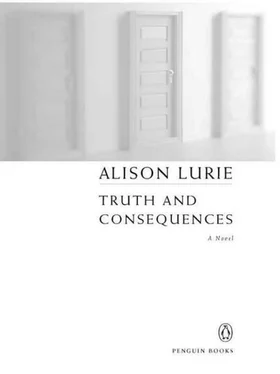“And, the best news!” he enthused in a rumbling near-whisper. Apparently, one of these patrons might be interested in having Alan design a ruined tower for his Connecticut estate. “All materials and expenses paid, naturally, and the reward (I don’t like the term ‘fee’) would be in the neighborhood of thirty thousand.” If Alan could view the site next time he was in the city, the patron would be happy to send a car.
Recalling Delia’s advice, Alan spoke very little; indeed, he hardly knew what to say. He allowed that the project might interest him, and, when presented with a contract, mentioned his lawyer.
At the gallery Alan had almost been able to forget his pain. It was only when he and Delia again stood on Madison Avenue that he realized how bad it had become, so that when she suggested they go for a quick cup of coffee before her lunch he had to decline. “I’m very grateful to you,” he told her. “Amazed by everything. But I’m not feeling too good. I’ve got to get a taxi back to Morningside Drive and lie down.”
“But that’s so far,” Delia protested. “Why don’t you go to where I’m staying, right across the park? I’ll come back there as soon as this stupid lunch is over.”
“Well—”
“Look, here’s the key.”
“Well—thank you.”
Once he reached Delia’s friend’s apartment, Alan had taken a strong painkiller and collapsed on the hard black leather sofa. Half an hour later, when the drugs had begun to work, he realized that he was hungry. He couldn’t go out to buy lunch, however, because he had Delia’s key, and she would surely be back soon. He explored the minimalist kitchen and found nothing to eat except a box of crackers, a can of anchovies, a bottle of tonic water, and one of gin.
Presumably Delia was having all her meals out. He remembered Jane saying that she didn’t cook: her househusband, Henry Hull, took care of all that. The thought was unpleasant to Alan. A woman, he felt, should be able to cook and even enjoy cooking. Also he had never liked the idea that Delia was married to Henry Hull. Henry was a negligible person, a freeloader with no real job, who seemed to have accomplished nothing in over fifty years, and yet somehow projected an ironic, negative attitude toward everything, including his beautiful and gifted wife.
When an hour and a half had passed, Alan began to feel aggrieved. He took the contract Jacky Herbert had given him out of his jacket and discovered that according to it the gallery would get fifty percent of any sales and the exclusive right to market his work. He felt more aggrieved than before. Where the hell was Delia? Was she just going to abandon him here, starving in this minimalist box? He recalled a remark of Jane’s, that Delia was a complete egotist, who saw other people only in terms of their relation to herself. It was true that his damaged physical condition, his constant pain, did not appear to register with her as it did with others. Until now Alan had found this strangely soothing. Unlike less self-focused persons, she did not see or treat him as an invalid. Now it had become clear that she also did not consider him as someone who needed lunch.
Well, the hell with her. Angrily he ripped open the box of crackers and the can of anchovies, and made himself a strong gin and tonic. He looked about for something to read to pass the time, but all he could find was a pile of expensive fashion magazines and a few paperback thrillers of the Woman in Peril type, a genre he despised. In his experience, women were seldom in peril.
He lay down on the sofa again. It was harder than ever, and made his back ache worse. Why had he ever come to New York? Or, at least, why hadn’t he let Jane come along and take care of him? She had offered to do so, after all, though without much enthusiasm. Alan knew the answer to that one: he had wanted to spend time alone with Delia Delaney, who clearly had no interest in spending time alone with him.
He rose and went into the adjoining room, which was as minimally furnished as the other, but messy rather than bare. A suitcase lay open on the thick gray carpet, spilling multicolored debris. The king-sized bed was a welter of crumpled gray silk sheets and pillows, and clothes, clearly Delia’s, were strewn everywhere. They were lacy and silky, colored like a rose garden at dusk: velvety darks, glowing dusty pinks and reds, creamy beiges and whites. It was an entirely different palette from that of Jane’s closet, a tidy ranked range of blue and khaki and navy. And even when Jane traveled, her clothes were always hung up or folded in a drawer.
Usually Alan preferred order, though he had sometimes been inconvenienced by Jane’s far greater devotion to this principle. Now he had a sudden despairing desire to add to the disorder of this room. He lowered himself painfully onto the unmade bed and buried his head in a pillow that smelled both spicy and sugary. Under his left hand was something slippery—a white satin nightgown, he realized, pulling it toward him and imagining heat rising from it. Probably this is the nearest you’ll ever get to Delia, you pathetic fool, he told himself. She might be interested, but if you make a move, she’ll find out you can’t carry through.
All right, why not? he thought. Holding the satin nightgown against his face, he turned on his side, fighting a short spasm of pain, then dragged down the zipper of his pants. Why not be as near as I ever will be to her, while I can? he thought feverishly.
Half an hour later Alan woke from a blurred sleep, still a little drunk. The apartment was still empty. The hell with her, the hell with everything, he thought. He stood up dizzily, returned to the sitting room, and began to gather his things. But as he did this the doorbell chimed. It was Delia, looking far less urban and formidable than before: more wiry golden tendrils had escaped from her chignon, and her lipstick had been smudged off.
“Oh, I’m so tired,” she wailed, heading for the black leather sofa and crumpling onto it. “These awful, awful shoes.” She kicked them off.
“Did you frighten your new editor?”
“I hope so.” She smiled. “But he’s essentially dense. His ideas for the anthology of fairy tales he wants me to edit are so banal, so brainless. It’s hard to frighten people like that.”
“Did you get a good lunch, at least?” Alan asked, hoping not so much for an answer as for the question, Did you?
“Oh, yes. Salmon and snow peas and mango sherbet. First-rate Chablis too. New York has such great restaurants.”
“I ate the crackers and anchovies your friend left, it was all I could find. And my back was giving me hell, so I had a couple of drinks.”
“Mm.” Delia showed no interest in or objection to this fact. As Jane had said more than once, she was completely self-centered. But now it occurred to Alan that for him Delia’s egotism, her self-centeredness, was one of her great attractions. She might not notice or sympathize with his pain and disability, but she also never treated him as an invalid, a member of a different, inferior species.
“I adore the city at this time of year,” she breathed. She half sat up, pulled off her black jacket, and flung it on the floor, then stretched out on the sofa, extending rounded legs encased in sheer black tights. “It’s such a relief to be here, where nobody notices me and I can be anonymous.”
“Really?” Alan said, looking down at her—both admiring the view and angry at its effect on him. “I can’t believe you wouldn’t be noticed anywhere.”
“Well, it’s true, I am sometimes recognized in New York,” Delia admitted, misunderstanding. “But it’s not oppressive, the way it’s getting to be in Corinth. Ever since those posters went up everywhere, announcing the reading next week.”
Читать дальше







![Кэмерон Доки - Правда и ее последствия[Truth and Consequences]](/books/79610/kemeron-doki-pravda-i-ee-posledstviya-truth-and-con-thumb.webp)




